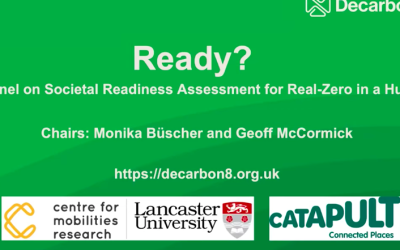Last week Cemore met with Lancaster’s James Faulconbridge to discuss his role in the new research project, AirCiF (Airport City Futures). Although still in the stages of development, the project’s design plans are underway, the team’s initial reflections that emerged from the conclusion of their first meetings have been gathered and an overview of the goals they intend the project to ultimately deliver have been decided.
James explained how the research plans to offer ‘a new aeromobilities management concept/strategy to companies’ whilst also gaining a deeper understanding of how aeromobilities are produced and consumed in relation to society. Interestingly, concerning the latter, James explained that AirCiF is innovative in that it intends to move away from the ‘predict and provide paradigm’ (Cwerner et. al. 2009), in which the development of air travel is determined by technology and demand. Instead, it is to investigate the socio-technical dimensions involved, merging knowledge from across a wide variety of disciplines (including mobilities studies, sociology, ethnography, geography, transport planning, economy and architecture and design), in order to gain a more holistic understanding of airport cities, passengers, business travel and the future of aviation management.
Given this interdisciplinary approach and wide range of goals, the project is already sparking an eclectic variety of possible questions to explore and analyse, just a few of which are:
- -How has virtual mobility given small businesses in particular the opportunity to be global?
- -Has/how has global work become the “normal” condition for doing business in contemporary societies?
- -Who are the Pandion flyers? What are they like? (Pandion flyers are those that pass the diamond level of the Eurobonus frequent flyer programme)
- -The question of the ‘mobile worker’, who are these people? What is their lifestyle, social life and experience of travel?
- -What forms of work necessitate business travel?
- -What are the changes of work and air travel over time?
The project plans include: interviewing secret top-level Pandion travellers; publishing international journal articles; testing new aeromobilities management concepts in a pilot company and establishing a Danish Aviation Academy. With all this and various other activities, AirCiF is shaping up to be a highly innovative, impactful and intriguing project.
Updates on AirCiF’s most recent progress and findings will be published on this page. Otherwise, for further information about the project until then, visit Aalborg University.



